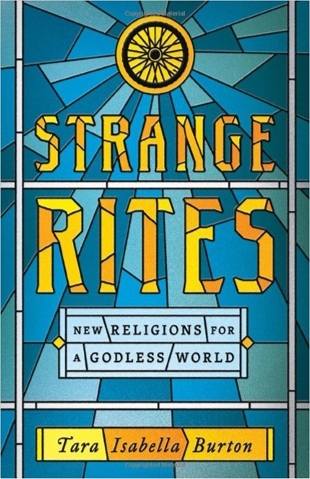Religious scholars and cultural analysts have been trying to map the complicated phenomenon of the changing landscape of religion in the United States. The numbers of people who call themselves Christians are steadily declining, while the "Nones," those who claim no religious affiliation on polls and surveys, is now the fasting growing group in the population overall. A third of millennials identify themselves as religiously unaffiliated, and about a quarter of American adults overall. We call this group "spiritual independents" because although some do say they are atheists and agnostics, most consider themselves to be "spiritual."
These people are on a quest, like religious people in the past, but they are seeking new forms of community and their own practices and devotions. They advocate intuition rather than institutions. Tara Isabella Burton finds them fascinating, and her book Strange Rites makes for an equally fascinating read.
Burton has the experience, the credentials and the bold imagination to guide us through this unprecedented terrain. She is a columnist on millennial religion for Religion News Service, a contributing editor at The American Interest, and the author of Social Creature, a novel published in 2018. She received a doctorate in theology from Trinity College, Oxford, where she was a Clarendon Scholar, 2017. She also works as a touring expert for National Geographic, lecturing on expeditions in the Caucasus and the Alpe-Adrina.
With energy and panache, Burton dazzles us with her wide-ranging commentaries on the immense transformations taking place in what she calls a post-religion age where culture wars are raging, spiritual anarchy is popping up in strange places, and many of those who have left Christian churches are still yearning to create their own special tribes with a strong and a keen sense of belonging.
Burton takes a detailed look at seven different faith systems which have come alive during the decline of Christianity. She covers the beliefs and practices of fandoms and fan fiction sites with the Harry Potter franchise leading the way; the growing popularity of Wicca and its many neopagan rituals; the wellness culture and its emphasis on self-care, characterized by products promoted by Gwyneth Paltrow's Goop like jade eggs and juice cleanses.
The diversity of "new religions" take adherents on a jaunty quest for meaning, purpose, and ritual. Internet and consumer capitalism have gotten into this post-Christian religious search which excludes an institutional base, creeds, and clergy. Three more options for seekers are what Burton calls the California Idealogy of Silicon Valley; the Progressive Social Justice Movement, and the Atavism of alt.Right culture.
These spiritual orientations offer lively opportunities to think about your view of what it means to be human, to be free, to reside in a hackable future, to think about utopianism, to probe the religious dimensions of extremist groups, and to contemplate the importance of modern justice movements.
It will be edifying to see what kinds of rituals, values, mystical excursions, and philosophies these devotees of "remixed" religions come up with, especially in the face of future environmental disasters, economic woes, more global pandemics, and the ongoing crises facing millions of homeless refugees.
After reading Burton's encyclopedic overview of seven new faiths in America, it comes as no surprise that she is critical of the self-oriented character of these paths and their swerve away from transcendence. What does she call for as an alternative? It is not something you would expect. In an opinion piece for the New York Times, she writes:
"Many of us call ourselves 'Weird Christians,' albeit partly in jest. What we have in common is that we see a return to old-school forms of worship as a way of escaping from the crisis of modernity and the liberalist-capitalist faith in individualism."
By a return to "old-school forms of worship," she means Eastern Orthodox piety and an affirmation of the Latin Mass.
